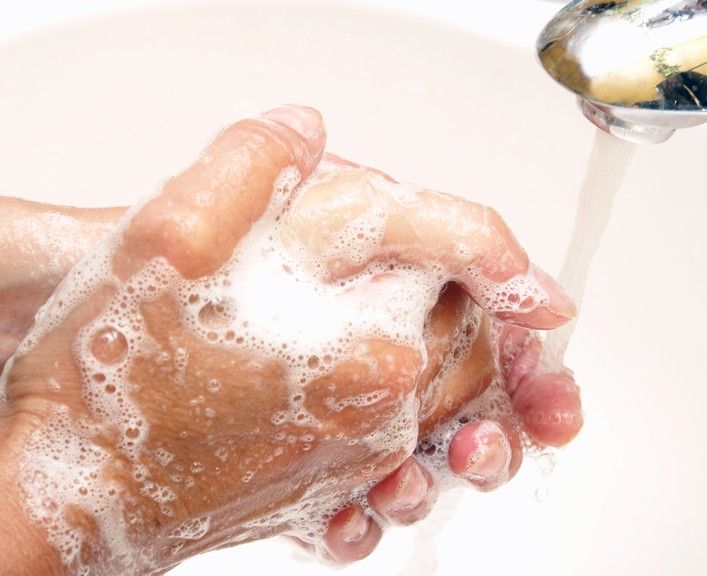
Previous
The Holy Grail of Advanced Liver Disease Treatment

Next
Improve Your Gastrointestinal Health with Probiotics and Digestive Enzymes
Do Antibacterial Soaps Impact Your Liver?
We wash our hands to keep clean and prevent the spread of infection, but hand washing might also pose a liver cancer risk.
The old adage, “cleanliness is next to godliness,” has served many generations well by encouraging people to wash away soil and germs. There is little doubt that regular hand washing is the basis of infection control; however, not all soaps are created equally.
Originally used in hospital settings, the antimicrobial ingredient Triclosan is found in numerous, daily, cleansing products. This germ-killing chemical has been suspected of doing more harm than good in the past, but new evidence links Triclosan to liver health peril.
What Is Triclosan?
Triclosan is a chemical added to many products to reduce or prevent bacterial contamination. Originally entered as a pesticide in 1969, Triclosan is a chlorinated, synthetic, broad spectrum, antimicrobial agent. As society attempts to eradicate all traces of bacteria from our environment, this chemical can be found in products such as soaps, toothpastes, wipes, cutting boards, mattress pads, cosmetics, clothing, cookware, furniture and toys. An estimated 75 percent of today’s liquid antibacterial soaps and 30 percent of soap bars contain Triclosan. Despite its current legality, this antibacterial chemical has been the source of controversy for decades.
According to the U.S. Food and Drug Administration (FDA), there is no evidence that Triclosan added to soaps and body washes provides extra health benefits over regular soap and water. In addition, antibacterial soaps containing Triclosan:
- have the potential to create antibiotic-resistant bacteria.
- have been shown to act as endocrine disruptors, interfering with the body’s regulation of thyroid hormone.
- may increase the risk of children developing allergies (including peanut allergy and hay fever) with prolonged exposure.
- may interfere with muscle contractions in human cells.
- are bad for the environment, persisting in our water supply and disrupting algae’s ability to perform photosynthesis.
New Research on Triclosan
Researchers from California have uncovered an additional health concern linked to Triclosan exposure. As published in a November 2014 edition of Proceedings of the National Academy of Sciences of the United States of America, the researchers concluded that excessive amounts and long term exposure of Triclosan can lead to liver toxicity and even give rise to liver fibrosis and cancer. According to their animal study:
- Triclosan may interfere with the constitutive androstane receptor, a protein responsible for detoxifying foreign chemicals in the body.
- To compensate for the toxic stress, liver cells proliferate and become fibrotic over a period of time.
- Triclosan substantially accelerates liver cancer development, acting as a liver tumor promoter.
- Any risk to the liver was found to be greater when Triclosan was combined with other antimicrobial compounds.
Triclosan Exposure
These findings are especially alarming because repeated exposure to Triclosan is surprisingly high. It’s not just hospital workers who wash their hands with antimicrobial soap throughout the day. Research has shown that small quantities of the chemical can persist after treatment at sewage plants and, as a result, it is frequently detected in streams and other bodies of water.
As the most universal antibacterial, Triclosan has been found in trace amounts in 97 percent of breast milk samples from lactating women and in the urine of nearly 75 percent of people tested. According to Robert Tukey, professor at University of California, San Diego School of Medicine, “Triclosan’s increasing detection in environmental samples and its increasingly broad use in consumer products may overcome its moderate benefit and present a very real risk of liver toxicity for people, as it does in mice.”
Learning that the soap you use repeatedly could harm your liver is disturbing, but it is especially troubling to those who already have some level of liver disease. Those with a compromised liver may already have a backlog of toxins in their blood stream and are already at an elevated liver cancer risk. As such, anyone with chronic liver disease would be putting their health in even greater jeopardy by intentionally exposing themselves to Triclosan. Thankfully, the FDA requires manufacturers to reveal Triclosan in a product’s label.
For preventing the spread of bacteria, hand washing remains an essential health practice. However, show your liver some love by avoiding Triclosan-containing products. The liver cancer threat of Triclosan exposure is real, but it can be particularly devastating for individuals living with a chronic liver ailment.
http://www.epa.gov/oppsrrd1/REDs/factsheets/triclosan_fs.htm, Triclosan Facts, Retrieved November 19, 2014, United States Environmental Protection Agency, 2014.
http://www.fda.gov/forconsumers/consumerupdates/ucm205999.htm, Triclosan: What Consumers Should Know, Retrieved November 19, 2014, US Food and Drug Administration, 2014.
http://www.mayoclinic.org/healthy-living/adult-health/expert-answers/triclosan/faq-20057861, Should I Avoid Products that Contain Triclosan?, James M. Steckelberg, MD, Retrieved November 23, 2014, Mayo Foundation for Medical Education and Research, 2014.
http://www.ncbi.nlm.nih.gov/pubmed/25404284, The commonly used antimicrobial additive triclosan is a liver tumor promoter, Yueh MF, et al, Retrieved November 19, 2014, Proceedings of the National Academy of Sciences of the United States of America, November 2014.
http://www.sciencedaily.com/releases/2014/11/141117154612.htm, The 'dirty' side of soap: Triclosan, a common antimicrobial in personal hygiene products, causes liver fibrosis and cancer in mice, University of California, San Diego Health Sciences, Retrieved November 19, 2014, ScienceDaily, 2014.
http://www.smithsonianmag.com/science-nature/five-reasons-why-you-should-probably-stop-using-antibacterial-soap-180948078/?no-ist, Five Reasons Why You Should Probably Stop Using Antibacterial Soap, Joseph Stromberg, Retrieved November 19, 2014, Smithsonian.com, 2014.
http://www.thehealthsite.com/news/beware-common-antibacterial-in-soaps-shampoos-may-damage-liver/, Beware! Common antibacterial in soaps, shampoos may damage liver, Retrieved November 19, 2014, TheHealthSite, 2014.







unbelievabe
How much damage did that cost so many of us.